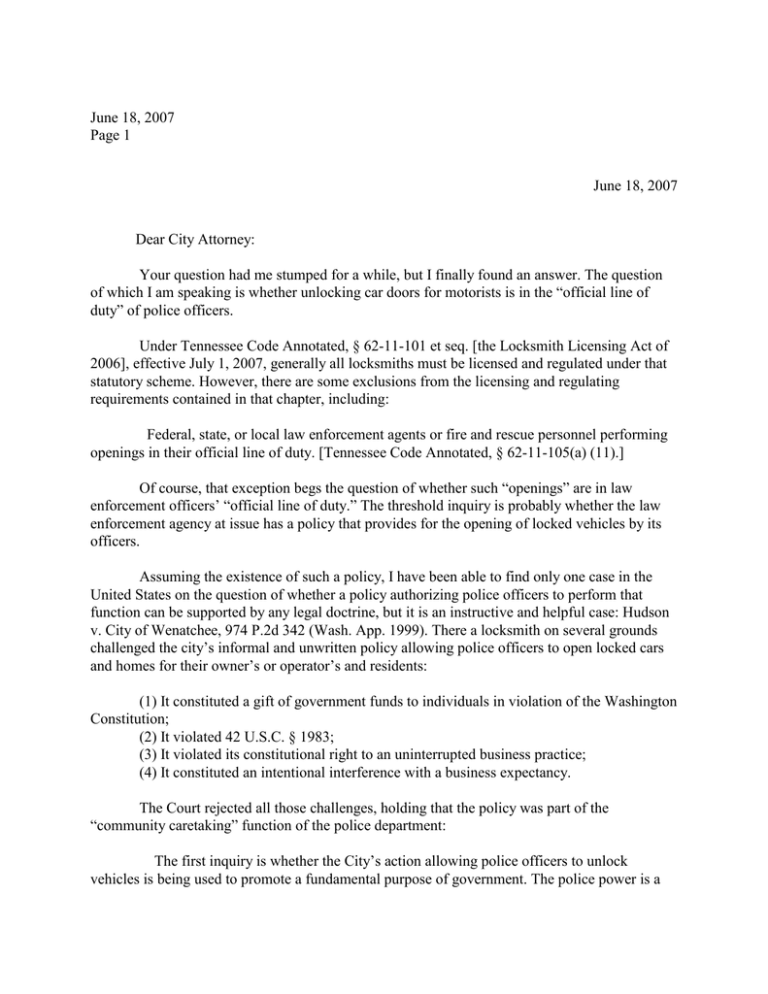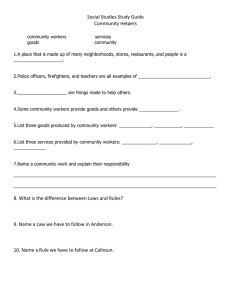June 18, 2007 Page 1 Dear City Attorney:
advertisement

June 18, 2007 Page 1 June 18, 2007 Dear City Attorney: Your question had me stumped for a while, but I finally found an answer. The question of which I am speaking is whether unlocking car doors for motorists is in the “official line of duty” of police officers. Under Tennessee Code Annotated, § 62-11-101 et seq. [the Locksmith Licensing Act of 2006], effective July 1, 2007, generally all locksmiths must be licensed and regulated under that statutory scheme. However, there are some exclusions from the licensing and regulating requirements contained in that chapter, including: Federal, state, or local law enforcement agents or fire and rescue personnel performing openings in their official line of duty. [Tennessee Code Annotated, § 62-11-105(a) (11).] Of course, that exception begs the question of whether such “openings” are in law enforcement officers’ “official line of duty.” The threshold inquiry is probably whether the law enforcement agency at issue has a policy that provides for the opening of locked vehicles by its officers. Assuming the existence of such a policy, I have been able to find only one case in the United States on the question of whether a policy authorizing police officers to perform that function can be supported by any legal doctrine, but it is an instructive and helpful case: Hudson v. City of Wenatchee, 974 P.2d 342 (Wash. App. 1999). There a locksmith on several grounds challenged the city’s informal and unwritten policy allowing police officers to open locked cars and homes for their owner’s or operator’s and residents: (1) It constituted a gift of government funds to individuals in violation of the Washington Constitution; (2) It violated 42 U.S.C. § 1983; (3) It violated its constitutional right to an uninterrupted business practice; (4) It constituted an intentional interference with a business expectancy. The Court rejected all those challenges, holding that the policy was part of the “community caretaking” function of the police department: The first inquiry is whether the City’s action allowing police officers to unlock vehicles is being used to promote a fundamental purpose of government. The police power is a June 18, 2007 Page 2 fundamental purpose of government. See Const. Art. XI, § 11. It extends not only to the preservation of the public health, safety, and morals, but also to the preservation and promotion of the public welfare. [Case citations omitted by me.] This recognizes the community caretaking function of police officers and exists so that they can assist citizens and protect property. [Case citations omitted by me.] Courts have recognized that police officers acting in their community caretaking function occasionally perform services in addition to enforcement of the penal laws. [Case citation omitted by me.] Many citizens look to the police to assist them in a variety of circumstances, including delivering emergency messages, giving directions, searching for lost children, assisting stranded motorists, and rendering first aid. [Case citation omitted by me.] Thus, actions which fall into the community caretaking function are indeed a fundamental purpose of government. The city’s policy which allows police officers to assist citizens locked out of their cars is part of this community caretaking function. In carrying out the policy, officers are assisting citizens and promoting a fundamental government purpose. There is no unconstitutional gift of government funds. [At 346] As to the plaintiff’s § 1983 challenge, the Court reasoned that they must show that the city’s policy of allowing its police officers to open locked cars deprives them of a constitutional right. However, for purposes of § 1983, “They [the plaintiffs] did not establish a legitimate claim of entitlement, arising from implied contract, customs, practices, and de facto policies, to operate their locksmith business.” [At 347] Even had the plaintiffs been able to establish such a deprivation, continued the Court, they could show no damage from the city’s policy; the income of their business had increased each year. [At 347] The plaintiff’s claim that the city’s policy reflected an interference with their business also failed, said the Court, because: The record here does not establish the requisite elements of intentional interference with a business expectancy. No contract existed between the Hudsons and the City. No contract existed between the Hudsons and any of the citizens helped by the police. The Hudsons complain that had the City police not unlocked vehicle doors for citizens, those citizens would not have hired them. However, the Hudsons demonstrated no facts supporting this allegation. [At 347] I cannot think of any claim a business or any other person could make under the Tennessee Constitution, statute, or doctrine that would result in an outcome different from that in Hudson v. City of Wenatchee, above. That is true, even though I know of no Tennessee case that mentions the community caretaking doctrine. In fact, I had never heard of that doctrine until I began researching your question. But it is a doctrine well established in a multitude of cases in the United States in connection with police services. In addition, there are many recent cases on June 18, 2007 Page 3 that doctrine. The community caretaking doctrine appears to have its Genesis in the U.S. Supreme Court case of Cady v. Dombrowski, 413 U.S. 433, 441, 93 S.Ct. 2523, 37 L.Ed.2d 706 (1973), in which the High Court observed that: Local police officers, unlike federal officers, frequently investigate vehicle accidents in which there is no claim of criminal liability and engage in what for want of a better term, may be described as community caretaking functions, totally divorced from the detection, investigation, or acquisition of evidence relating to the violation of a criminal statute. [At 37 L.Ed. 2d 715] In that case, the Court upheld the warrantless search of a motor vehicle the police found disabled on the side of the road after it had hit a guard rail and a bridge abutment. The police located the driver in a nearby town and discovered him to be a Chicago police officer who was so intoxicated that he was unable to make arrangements for the towing of the vehicle. The police had the vehicle towed and subsequently searched it to recover the driver’s police revolver to protect it from vandals. The search disclosed evidence linking the driver to a murder. The Court said of the search that, “Where, as here, the trunk of an automobile, which the officer reasonably believed to contain a gun was vulnerable to intrusion by vandals, we hold the search was not ‘unreasonable’ within the meaning of the Fourth and Fourteenth Amendments.” [At 37 L.Ed.2d 718.] Generally, as in Dombrowksi, above, most of the community caretaking doctrine cases arise in the context of whether a particular search and seizure met one of the exceptions to the general Fourth Amendment requirement that searches and seizures be supported by a warrant. One of those exceptions is for community caretaking functions of law enforcement. With respect to motoring traffic it is said in State v. Bacher, ____ N.E.2d ____ (Ohio App. 1 Dist. 2007), that: “We also note the community care-taking exception to the Fourth Amendment’s warrant requirements. Under this exception, officers have a duty to aid drivers in distress.” [Citing Dombrowski.] [2007 WL 549751, at 5] . Other cases involve the question of whether a police officer has the right to “open doors” in other community caretaking contexts. In State v. Albaugh, ____ N.W.2d ____ (N.D. 2007), a law enforcement officer made an arrest and seizure of illegal drugs inside a business in which the defendant was living. The police officer was at the business at the request of the landlord. In upholding the arrest and seizure without a warrant, the Court outlined several types of law enforcement-citizen encounters, including “(3) community caretaking encounters, which do not constitute Fourth Amendment seizures.” In this case: The essential question,” said the Court, “is whether Zeeb [the officer] had the right to June 18, 2007 Page 4 enter the shop.” The district court found “officer Zeeb entered the premises through an open and unlocked door at the request of the landlord....” By the tenant’s concession and the terms of the lease, the landlord had a right to enter the shop...the landlord was the individual for whom Zeeb was performing the community caretaker function. The landlord requested Zeeb to be present in case he encountered a tenant or problems arose... [At 2007 WL 1633439, at 3.] In the unpublished opinion of State v. Poticher, 2007 WL 987165 (N.J. Super. A.D.), the Court applied the community caretaking doctrine to uphold the right of police officers to effect the arrest of the defendant under these facts: The police officers had picked up a 15 year old boy riding his bicycle past curfew, and took him home. When they arrived there, they were admitted into the house by the boy to talk to his father who the boy observed was lying on the couch. The boy’s father was discovered by the officers to be intoxicated, and he subsequently objected to the presence of the officers and shoved one of them, an act for which he was arrested. The Court noted that although the police officers had not knocked on the door, they were entitled to enter the residence at the invitation of the defendants’s son, and upon discovering the defendant to possibly be unfit to take custody of his son, were entitled to question him further. The Court reasoned that: It is well recognized that in addition to investigating crimes, the police also engage in what has been described as community caretaking functions, totally divorced from the detection, investigation, or acquisition of evidence relating to the violation of a criminal statute. [Citations omitted by me.] The performance of these police responsibilities may provide the requisite authority for entry into a private residence without a warrant. [Citations omitted by me.] [At 2] The above cases–and many others--reflect the existence of the community caretaking doctrine in the United States. Hudson v. City of Wenatchee, above, stands for the proposition that opening locked motor vehicles (and apparently even houses) is also a community caretaking function that is in the line of duty for police officers, presuming, that the police officer’s employer has a policy or custom supporting the performance of that function. Although the other cases involve the application of the community caretaking function to searches and seizures, they also support the proposition that if a police officer makes an entry into a locked motor vehicle at the request of a motorist, with no initial intention of making a search of the vehicle for the detection of criminal activity or evidence, he is performing a community caretaking function. Obviously, there may be circumstances under which a city that allows its police officers to open the locked doors of motorists might be liable under the Tennessee Tort Liability Act for damages that might arise in carrying out that policy. Sincerely, June 18, 2007 Page 5 Sidney D. Hemsley Senior Law Consultant SDH/

